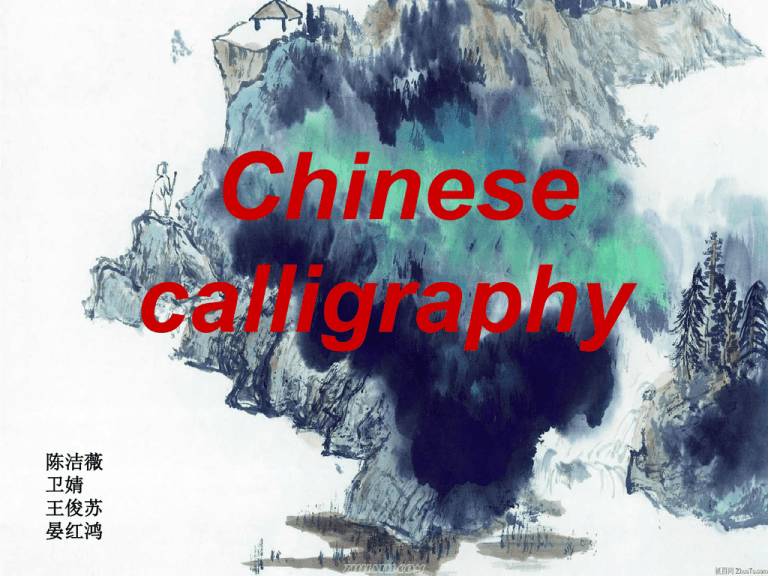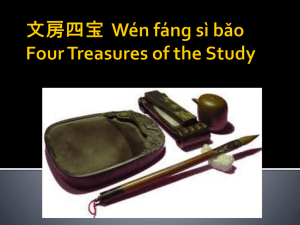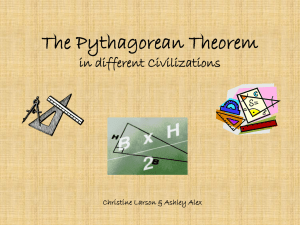Chinese calligraphy
advertisement

Chinese calligraphy 陈洁薇 卫婧 王俊苏 晏红鸿 • The word "calligraphy" is derived from a Greek word meaning beautiful writing. • It has been appreciated as an art form in many different cultures throughout the world, but the stature of calligraphy in Chinese culture is unmatched. Click • Chinese calligraphy which serves as a tool of information communication by way of writing materials infuses our mode of thinking . • Chinese calligraphy is a art practice which manifests Chinese people specific tinking style,personality , temperament(性情) and inclination(癖好). The features of Chinese Calligraphy Chinese philosophical thought (哲学思想): • “Yin and Yang Five Elements”(阴阳五行) • “Heaven and Man” (天人合一) • “The Doctrine of Mean” (中庸中合) The unique sense of time and space • Blend mode of thinking and physical movement. • An activity of self-cultivation. • An effective way to enjoy healthy life and longevity. History of Chinese Calligraphy • Origin: • Calligraphy came with invention of the characters . • Gia Gu Wen, indeed, is a major style of Chinese calligraphy. Wang Hsi-Chih’s Lan Ting Prologue • Wei & Jin Dynastie: • Calligraphy achieved the best in the history at this time. Chinese calligraphy theories published during this period . • Wei Heng's ( 衛 恆 ) • Calligraphy Postures of Four Styles ( 四 體書勢) • Madame Wei's ( 衛 夫 人 ) • Map of Strokes Disposition( 筆 陣 圖 ) • Wang Hsi-Chih’s ( 王 羲 之 ) • Discussion on Calligraphy ( 書 論 ) Basics of Chinese Calligraphy The Four Treasures • The four treasures of a Chinese calligrapher's (or scholar's) studio are paper, brush, stone. ink stick, and ink Paper • Paper is one of the most famous Chinese inventions. • Chinese practice calligraphy on Xuan Paper that is used uniquely for calligraphy and painting. Brushes • painted pottery, bamboo slips, and silks are all writing materials for brush. • softness and unrestrained freedom • look more vivid, spirited, and rich in different styles. Ink stick / Ink stone • The ink stick is the unique pigment used for Chinese brush painting and calligraphy. • The raw materials of ink stick are pine, oil, lacquer(漆), and etc. • A good ink stick can produce beautiful shades of ink density on a good and smooth ink stone. Others: • Water dropper / antique ink stone, brush hanger jade paperweights Styles of Chinese Calligraphy 篆書 Zuan Style (Seal Style) • The unification of Zuan Shu was in the Chin Dynasty • Solid and stable(结实稳定) • Small Seal Style (Tablet Shiao Zuan 小 篆) • Great Seal Style (Da Zuan 大 篆 ) Lan Ye Tai ( 琅Yi 琊Shan 臺 ) &( Tai San ( 泰Lee 山 Si ) Tablets 繹山 ) by 隸書:Li Style(Clerical Style) • germinated in the pre-Chin period ( 先秦 時代 ). • simplified the complicated strokes of Zuan Shu. • used a bend (弯)instead of making a roundabout turn Chin Li on bamboo rolls 草書Tsao Style(Running Style) • It was developed almost at the same time with Li Shu • the most simplified • abstract and difficult • "the Two Wangs" (二王) 行書 Hsin Style(Walking Style) • • • • • A style in between Tsao and Kai Styles established in the Han Dynasty write fast,freely expressed Hsin Tsao Shu ( 行 草 書 ) Hsin Kai Shu ( 行 楷 書 ). Zhong Yao’s work in Hsin Kai Shu 楷書Kai Style(Standard Style) Madame Wei’s small-scale Kai Shu • Initiated(创始)toward the end of the Han Dynasty. (by 王次仲) • symmetrical strokes (笔 划整齐对称) • A reference standard for modern Chinese characters handwriting, also develop another handwriting —— pen writing. • Marks the final shape of Chinese characters. Influence of Chinese Calligraphy Calligraphy played an important role in Chinese people’s daily life • • • • • Writing letters official documents literary works national celebrations and offer sacrifices weddings and funerals • associations and societies • professional calligraphy • special calligraphy class The spread of Chinese Calligraphy • In ancient time: where there are Chinese people, there are Chinese calligraphy. In our modern time: art ,architecture and design Calligraphy Special issue in Showa period of Japanese Protection of Chinese Calligraphy Culture Government’s efforts • Chinese Calligraphers Association (中国书法家协会) • National Art Center for the Study and Writing calligraphy (国家级书法艺术研究与创作中心) • some colleges and universities have established professional calligraphy. means of propaganda(宣传) and popularization(普及) of calligraphy. • Professional newspapers and magazines • Television and online media • Calligraphy’s foreign exchange activities Chinese Calligraphy is a part of China. Chinese Calligraphy is also among the world. Thank you! 陈洁薇 卫婧 王俊苏 晏红鸿






